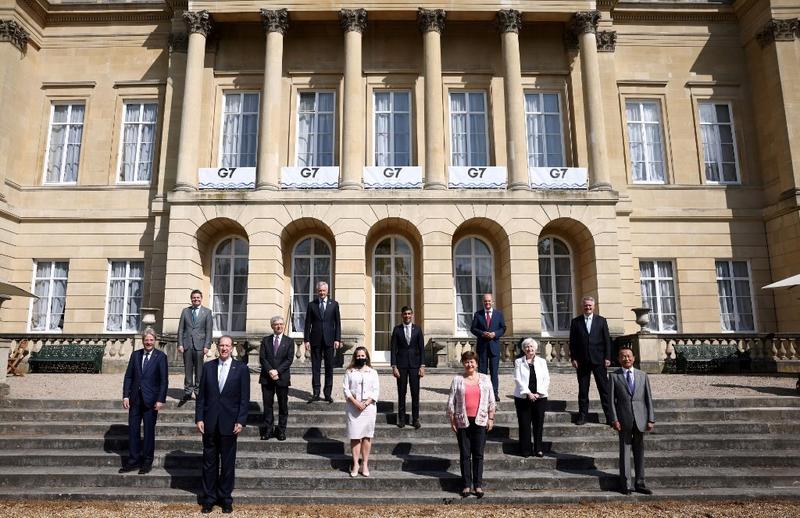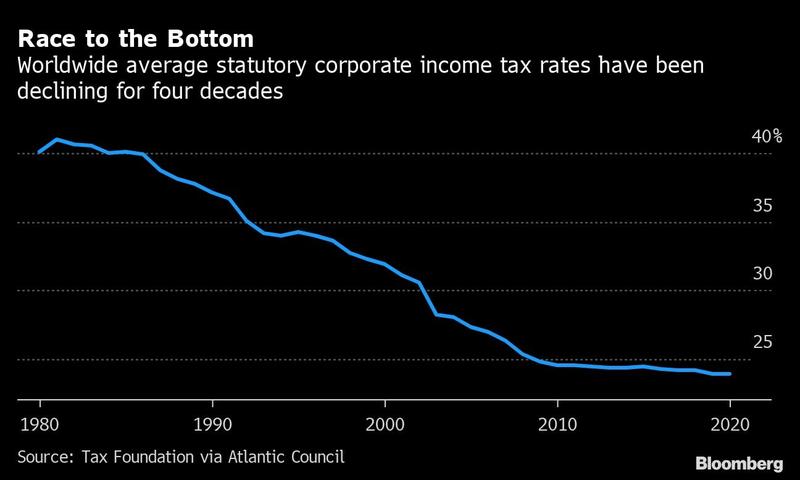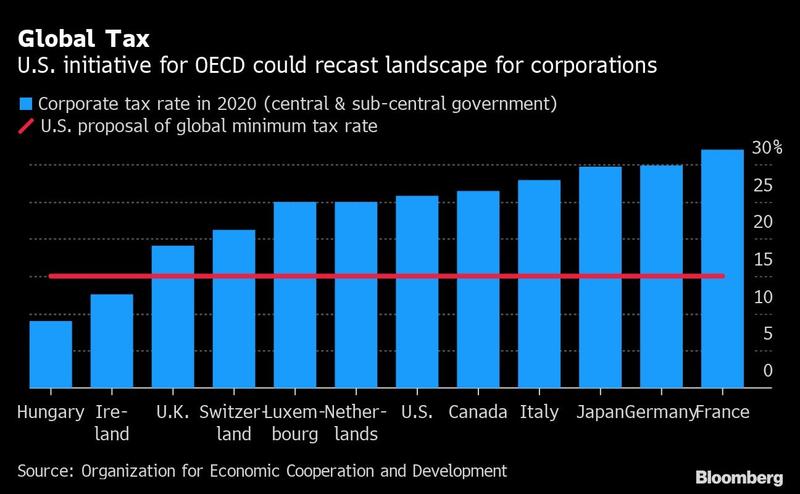 From left, European Commissioner for Economy Paolo Gentiloni, Eurogroup President Paschal Donohoe, President of the World Bank David Malpass, Italy's Economy and Finance Minister Daniele Franco, France's Economy and Finance Minister Bruno Le Maire, Canada's Finance Minister Chrystia Freeland, Britain's Chancellor of the Exchequer Rishi Sunak, Managing Director of the IMF Kristalina Georgieva, Germany's Finance Minister Olaf Scholz, US Treasury Secretary Janet Yellen, Secretary-General of the Organisation for Economic Co-operation and Development (OECD) Mathias Cormann, and Japan's Finance Minister Taro Aso pose for a family photoon the second day of the G7 Finance Ministers Meeting, at Lancaster House in London on June 5, 2021. (HENRY NICHOLLS / POOL / AFP)
From left, European Commissioner for Economy Paolo Gentiloni, Eurogroup President Paschal Donohoe, President of the World Bank David Malpass, Italy's Economy and Finance Minister Daniele Franco, France's Economy and Finance Minister Bruno Le Maire, Canada's Finance Minister Chrystia Freeland, Britain's Chancellor of the Exchequer Rishi Sunak, Managing Director of the IMF Kristalina Georgieva, Germany's Finance Minister Olaf Scholz, US Treasury Secretary Janet Yellen, Secretary-General of the Organisation for Economic Co-operation and Development (OECD) Mathias Cormann, and Japan's Finance Minister Taro Aso pose for a family photoon the second day of the G7 Finance Ministers Meeting, at Lancaster House in London on June 5, 2021. (HENRY NICHOLLS / POOL / AFP)
The Group of Seven rich nations secured a landmark deal that could help countries collect more taxes from big companies and enable governments to impose levies on US tech giants such as Amazon.com Inc and Facebook Inc.
The agreement by the G7 finance ministers in London satisfies a US demand for a minimum corporate tax rate of “at least 15 percent” on foreign earnings and paves the way for levies on multinationals in countries where they make money, instead of just where they are headquartered.
The agreement by the G7 finance ministers in London satisfies a US demand for a minimum corporate tax rate of “at least 15 percent” on foreign earnings and paves the way for levies on multinationals in countries where they make money, instead of just where they are headquartered
The deal is aimed at modernizing the century-old international tax code and cools transatlantic tensions that threatened to spill into a trade war under Donald Trump. But key details are still to be nailed down, more nations must sign on, and full implementation could take years.
US Treasury Secretary Janet Yellen, among the finance chiefs who hailed the announcement as an unprecedented step, said a final accord on which companies could see their profits taxed outside their home countries would include the likes of Amazon and Facebook.
ALSO READ: G7 'close to demanding' minimum corporate tax rate
”What you’re seeing is a revival of multilateralism, a willingness of leading nations in the G7 and G20, to cooperate to address the most critical challenges facing the global economies,” Yellen said after the meeting.
Focus will now shift to a July meeting of the Group of 20 finance ministers in Italy and long-running talks between about 140 countries at the Organization for Economic Cooperation and Development.
The G7 pact marks a step to re-write a global system that critics said allowed big companies to save billions of dollars in tax bills by shifting jurisdictions. It’s also help address complaints that major digital companies can make money in multiple countries and pay taxes only at home.
In response to the announcement, some of the world’s biggest tech companies focused on how the deal could help clear up the rules on where to pay taxes.
ALSO READ: Draft statement: G7 to back minimum global corporate tax
“Today’s agreement is a significant first step toward certainty for businesses and strengthening public confidence in the global tax system,” Facebook’s Global Affairs Vice President Nick Clegg said on Twitter.

An Amazon spokesperson said the OECD-led process “will help bring stability to the international tax system” and described Saturday’s deal as a “welcome step forward in the effort to achieve this goal.”
Under the Trump administration, the US had also refused to allow foreign governments to tax American digital companies, a key European demand.
The transatlantic division spiraled into a battle of unilateral measures and threats of trade sanctions, which although suspended, are still in place.
According to the communique after the London meeting, countries where big firms operate would get the right to tax “at least 20 percent” of profits exceeding a 10 percent margin. That would apply to “the largest and most profitable multinational enterprises,” potentially enabling the G7 to square the circle so that digital is included without being targeted.
ALSO READ: IMF chief optimistic for global agreement on corporate tax
Asked whether that means companies like Facebook and Amazon would be included, Yellen said they would qualify “by almost any definition,” and “most of those firms are likely to be included in this new scheme.”
The ministers of the UK and France both said they were now assured that tech giants would be in the cross-hairs of new rules, even as the final quantitative criteria are still to be determined.
“We’ve been fighting for four years in all European and international forums, here at the G7 and the G20 for a fair taxation of digital giants and for a minimum corporate tax,” France’s Finance Minister Bruno Le Maire said.

The antipathy in recent years was greatest between Paris and Washington. France was the first country to bypass the slow-going OECD process on how to tax profits, opting for a controversial levy exclusively on the digital revenues of large firms.
ALSO READ: France orders tech giants to pay digital tax
The G7 said that countries would “provide for appropriate coordination” to remove such digital services taxes. Resolving the exact sequencing of that could prove tricky, with countries unwilling to give up revenues before they have certainty over what they will gain from new global rules.
Italian Finance Minister Daniele Franco said he’ll aim to broaden the discussion when G20 finance ministers meet in July in Venice. Once the proposal is agreed, Italy will no longer need its digital tax, he said.
Japan’s Finance Minister, Taro Aso said the change in US leadership this year had opened space for an agreement and criticism of the big profits being made by tech companies also galvanized the group to take action.
Two Issues
Highlighting other remaining divisions, the finance minister of Ireland, whose country has attracted some of the world’s big businesses with low taxes, said any deal on a minimum rate must meet the needs of “small and large countries, developed and developing.”
Pushing in the other direction, Le Maire said the 15 percent is a starting point and France would fight for a higher rate in the coming weeks.
President Joe Biden's administration still needs approval from Congress and will hope the deal hands it leverage for its massive infrastructure program. It is seeking support from lawmakers to raise the domestic corporate tax rate to 28 percent from 21 percent. An international deal for 15 percent could help him because it offers multinationals options.
Two top Republican lawmakers said the agreement “appears premature given the many unanswered questions about the Pillar 1 and Pillar 2 proposals and their potential effect on American companies and US revenues.”
READ MORE: Wanted: Global digital tax push after virus, US vote stall talks
“We continue to caution against moving forward in a way that could adversely affect US businesses,” Senate Finance Committee Ranking Member Mike Crapo and House Ways and Means Ranking Member Kevin Brady said in a statement.
The OECD has said a final global deal may not come until October, with delivery requiring nations to pass the plan through national legislatures.
“There is important work left to do,” said OECD Secretary-General Mathias Cormann. “But this decision adds important momentum to the coming discussions.”


